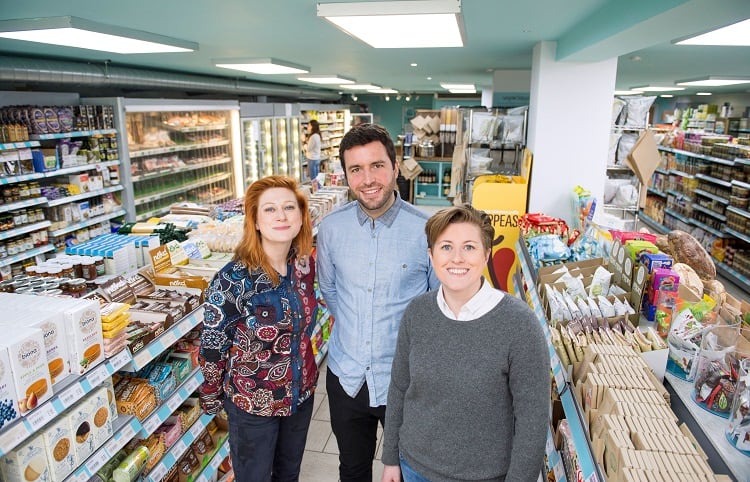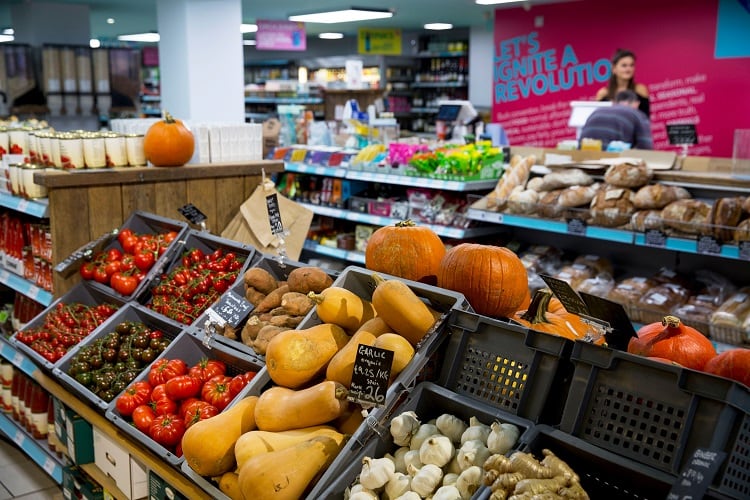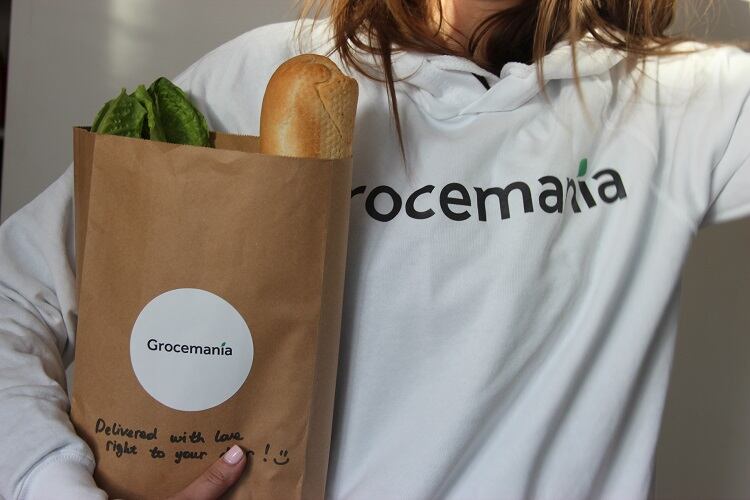HISBE – which stands for ‘how it should be’ – is an alternative supermarket located in Brighton on the south coast of England.
Created by three co-founders almost six years ago, the alternative supermarket ‘for the 21st century’ has since turned over £7m with a 12% operating profit year-on-year.
While healthy revenue is not unusual in the supermarket business, co-founder and executive director Ruth Anslow says “it’s what we do with the money that is different”. The social enterprise is balancing purpose and profit in an effort to ‘transform the food industry’.
‘Reinventing the way supermarkets do business’
Together with sister Amy and friend Jack Simmonds, Anslow launched this ‘new type of supermarket’ in 2013 to ignite change in today’s food system.
“We were worried about the way the food and the farming industry is right now and wanted to set a new course for supermarkets,” said Anslow at start-up event Bread and Jam in London this month. “We believe in reinventing the way supermarkets do business. We are committed to transforming the future of food.”
The major problem with today’s ‘big supermarket’ model, the executive director continued, is that it wasn’t invented for the 21st century. While ‘very consumer-centric’ – in that they have increased access to cheap food and enabled year-round sourcing – their models have created ‘unintended consequences’, we were told.
“The problem of this proliferation of food, the intensive production of food, and the globalisation of food production, is that it has created a lot of knock-on costs to society and the environment. We have a system that is based on cheap labour and cheap oil and externalised costs.
“Someone, somehow, is paying for the proliferation of bad food.”
HISBE’s retail model aims to buck this conventional system, the executive director continued: “Now is the time for supermarkets to evolve and we are here to help show the way.”
Retail values for the 21st century
HISBE was founded on values devised by its co-founders, covering local and sustainable sourcing, animal welfare standards, reduced food and packaging waste, health, and high ethical standards.
“If you designed a supermarket for the 21st century, you’d have mostly local food in there, because local food has lower food miles and a lower carbon footprint generally,” explained Anslow. “And if you’re working with small scale farmers, they potentially don’t use the pesticides and all the things that create problems in the globalised food industry.” The retailer is also committed to paying its staff fairly.

Existing for ‘objectives beyond just money’, HISBE describes itself as ‘purpose-led and commercially-driven’.
Beyond its founding values, what does this mean in practice? For starters, for every pound spent in HISBE, 67p goes to suppliers. “This might sound pretty simple, but it is absolutely revolutionary,” the co-founder explained. “Because when you spend a pound in most supermarkets, the suppliers get nine or 10p. And when you start paying suppliers properly, it has a ripple effect throughout the whole supply chain.”
When a consumer purchases a pint of milk at HISBE for 55p, 41p goes to the dairy farmer, she elaborated. This means the farmer can keep their cows in high welfare conditions, employ staff at the ‘real living wage’ and produce a fresh, affordable product.
The HISBE model also aims to keep half of all revenue within the local economy. “When you spend a pound at a big supermarket, only five pence stays in the local economy – they tend to centralise and externalise profit,” said Anslow.
“We try do to the opposite,” she continued, explaining that 50p of every pound spent in her store stays in the county. “We are spending that on local suppliers and local service providers. It has a knock-on effect where we are feeding our local economy.”
“We see ourselves as bucking convention and we see ourselves as disruptors. That is why we call ourselves supermarket rebels” – HISBE co-founder and executive director Ruth Anslow
A proof of concept designed to be copied
While HISBE lacks the scale required to make global, or even national, change, Anslow believes that cooperation between business competitors can.
“The action I call for us to cooperate on transforming the food industry. I call for coherence, collaboration, and coopetition between us for a higher purpose,” she said at the start-up event. “It is going to require a big shift away from the way we do business.”
It is for this reason that HISBE’s ultimate objective is to be replicated around the UK. Having proven there is ‘appetite’ for ethical consumerism in food, the retailer now wants competitors to copy its business model.
“This is what is required. Supermarkets can lead on these initiatives. We can test the solutions, we can innovate, but we can’t scale them.
“So we call on supermarkets to copy us, to work with us, to test [ideas] in our stores. The ethical market is [still young], there is plenty of room for all the supermarkets to grow that market collaboratively.”




